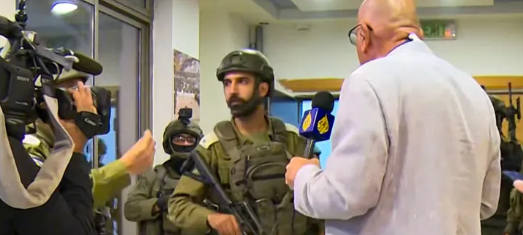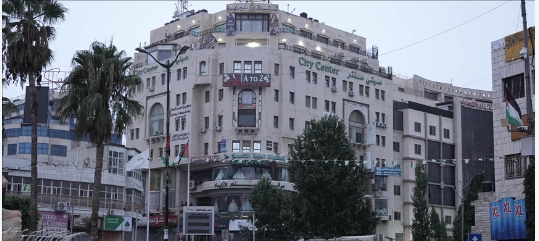Al Jazeera’s In a significant escalation of tensions between Israel and the international media, the Israeli military raided the West Bank offices of Al Jazeera on Sunday, issuing a 45-day closure order. This move, part of a broader campaign against the Qatar-based news network, comes amidst a backdrop of increasing hostilities between Prime Minister Benjamin Netanyahu’s government and Al Jazeera, which has long been a vocal critic of Israel’s policies in the region.
Al Jazeera, known for its in-depth coverage of conflicts in the Middle East, has been the subject of multiple accusations by Israeli authorities, who claim that the broadcaster incites violence and supports anti-Israeli sentiments. The channel, however, vehemently denies these accusations and maintains that it is being systematically targeted for simply doing its job—providing news coverage in one of the world’s most volatile regions.
This latest action has reignited the debate over press freedom in conflict zones and the role of the media in covering military occupations and wars. Al Jazeera has called the raid “a criminal act” and accused Israel of attacking press freedom, further straining relations between the broadcaster and the Israeli government.  For the more information click on this link
For the more information click on this link
Background of the Conflict
The conflict between Israel and Al Jazeera dates back several years, with tensions escalating during key moments in the Israeli-Palestinian conflict. Al Jazeera, which provides comprehensive coverage of the situation in the occupied Palestinian territories, has been a frequent target of criticism by the Israeli government. The network has been accused of being biased in favor of the Palestinian cause, a charge it denies.
The situation became more fraught after the 2021 Gaza conflict, during which Israeli airstrikes destroyed a building housing Al Jazeera’s Gaza offices. The Israeli government argued that the building was being used by Hamas, but Al Jazeera maintained that it was purely a civilian facility. The bombing raised concerns about the safety of journalists in conflict zones and prompted widespread international condemnation.
The closure of Al Jazeera’s West Bank office follows this pattern of hostilities. The Israeli government has ramped up its pressure on media outlets that it perceives as sympathetic to the Palestinian cause, and Al Jazeera has been one of the main targets of this campaign. This is the latest in a series of measures aimed at limiting the network’s ability to operate freely in the occupied territories.
Al Jazeera’s Raid and Closure Order
According to reports, armed Israeli forces entered Al Jazeera’s West Bank office on Sunday, presenting a court ruling that authorized the closure of the office for 45 days. The raid, broadcast live on Al Jazeera, showed tense moments as soldiers confronted the network’s West Bank bureau chief, Walid al-Omari. The military issued a statement later, justifying the closure by claiming that Al Jazeera was violating Israeli laws and promoting unrest.
“Al Jazeera has systematically incited violence against Israeli citizens and security forces,” the statement read. “This closure is a necessary step to preserve public order and national security.”
During the raid, military personnel also confiscated equipment, further hampering the network’s ability to report on events in the West Bank. In response, Al Jazeera released a statement condemning the raid, calling it “a criminal act” and asserting that the Israeli government is trying to silence critical voices.
Al Jazeera has long held that it operates according to international journalistic standards and that its coverage of the Israeli-Palestinian conflict is balanced. It has repeatedly denied accusations of bias or incitement, stating that its reporters are merely documenting events on the ground as they unfold.
Press Freedom Under Threat
This latest action against Al Jazeera has raised concerns about the state of press freedom in the Israeli-occupied Palestinian territories. The ability of journalists to operate freely in conflict zones is a fundamental aspect of transparent and accountable reporting. Media organizations like Al Jazeera provide crucial on-the-ground reporting that helps inform the international community about human rights violations, military actions, and the daily lives of people living under occupation.
Press freedom advocates have condemned the Israeli government’s actions, arguing that the closure of the West Bank office is part of a broader effort to suppress critical reporting. The Committee to Protect Journalists (CPJ) has called on Israel to reverse the closure order, stating that the country has a responsibility to allow journalists to do their work without fear of reprisal.
“Shutting down Al Jazeera’s West Bank office is a clear violation of press freedom,” said the CPJ in a statement. “Israel must allow journalists to operate freely and independently, particularly in areas where human rights are under scrutiny.”
The raid also comes at a time when press freedom is increasingly under threat worldwide, particularly in conflict zones. Journalists working in places like Syria, Yemen, and Afghanistan have faced unprecedented dangers, including targeted killings, arrests, and harassment. Al Jazeera, in particular, has faced severe challenges in covering these conflicts, with several of its reporters being killed in the line of duty.  For the more information click on this link
For the more information click on this link
Journalists Killed Since the Gaza Conflict
Since the start of the ongoing conflict in Gaza, four Al Jazeera journalists have been killed while reporting on the ground. These deaths highlight the extreme risks that journalists face in conflict zones, where they are often caught in the crossfire or become direct targets for their work.
The most high-profile incident occurred in 2021, when Israeli airstrikes leveled a building in Gaza that housed both Al Jazeera and the Associated Press. Although the Israeli government claimed that the building was being used by Hamas, there was no clear evidence to support this claim, and the destruction of the media office was widely condemned as a deliberate attack on press freedom.
Al Jazeera has repeatedly accused Israel of deliberately targeting its journalists in Gaza and the West Bank. The network has called for international investigations into the deaths of its reporters and has urged the United Nations and other international bodies to take action to protect journalists in conflict zones.
The Broader Implications for Israeli-Palestinian Relations
The closure of Al Jazeera’s West Bank office comes at a time of heightened tension between Israel and the Palestinian territories. The ongoing conflict in Gaza has led to widespread destruction, loss of life, and a deepening humanitarian crisis. In the West Bank, the situation is equally volatile, with frequent clashes between Israeli forces and Palestinian protesters.
Al Jazeera’s reporting from the ground has provided a crucial window into these conflicts for the international community, documenting the experiences of ordinary Palestinians living under occupation. The closure of the network’s office will undoubtedly impact its ability to cover the situation in the West Bank, potentially limiting the flow of information to the outside world.
For many Palestinians, Al Jazeera represents a vital source of news and information, particularly in an environment where local media is often restricted or censored. The closure of the office will likely be seen as an attempt to silence Palestinian voices and reduce international awareness of the situation on the ground.
Israel’s Media Strategy: A Censorship Campaign?
For critics, the closure of Al Jazeera’s West Bank office is part of a broader strategy by the Israeli government to control the narrative of the Israeli-Palestinian conflict. By limiting the access of international media organizations, Israel can shape the way the conflict is portrayed to the global audience.
This media strategy has been criticized by press freedom organizations, which argue that a free and independent press is essential for holding governments accountable. By targeting outlets like Al Jazeera, Israel risks further isolating itself from the international community and fueling accusations of censorship.
For its part, the Israeli government maintains that it is acting to protect national security and prevent incitement. However, the international backlash to its actions suggests that the government’s approach to controlling the media narrative is undermining its standing on the world stage.
Conclusion
The closure of Al Jazeera’s West Bank office marks another chapter in the long-running feud between the news network and the Israeli government. As tensions continue to escalate, the incident raises serious questions about press freedom, the safety of journalists in conflict zones, and the broader implications for Israeli-Palestinian relations.
As the international community watches closely, the need for accountability and transparency in the coverage of the conflict has never been more urgent. Journalists play a critical role in documenting the realities of war and occupation, and their ability to do so without fear of reprisal is essential for a free and informed global society.
The coming weeks will be crucial in determining the impact of this closure, both for Al Jazeera’s ability to report from the West Bank and for the broader media landscape in the region. ALSO READ:-UK PM Keir Starmer Rules Out Austerity as Labour Party Conference Opens, Setting Out Vision for Economic Growth 2024




